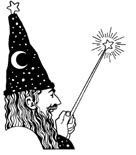
Whispering Glades Revisited: No Catholics Allowed
VITAL WORKS RECONSIDERED, #17
The Loved One. By Evelyn Waugh.
The Loved One was first published in 1948 and made quite a stir. It is still capable of making a stir, apparently. According to the cunning propaganda of the back cover of the Penguin reprint, an advertising genius provocatively advises us that “a few of its readers were shocked by its icy heart and sardonic savagery.” Come on in, it seems to say, you who are not so easily shocked, and perhaps you will be! But was The Loved One icier or more sardonic than Black Mischief (1932), where near the end the protagonist learns that his lady-love is being digested in the paunch of a cannibal? At the end of The Loved One, the protagonist, a minor British poet soon to return to his homeland, calmly watches the earthly extinction of his ex-girlfriend, an utterly mindless top-level cosmetologist at Whispering Glades cemetery (Forest Lawn): He “settled down to await his loved one’s final combustion.” Her next-to-last combustion, some mean-minded readers may be tempted to think, but they will be wrong, for surely God in his mercy will be tolerant of this utterly mindless young American atheist who is so totally unaware that as an atavistic Greek she is still in love with pagan Death, both in the workplace and in her passing on. The girl had stupidly committed suicide and now the evidence is being processed (consumed). But what is so shocking? The manner of her death or the manner of her disposal? Aimée Thanatogonos is at last one of a crowd, for if anything is certain it is that all who live must die, and God will deal with the hereafter. But it is too restrictive to speak of “the American way of death” when what is at question is the American way of life, stretching the term a little.
Evelyn Waugh was a Catholic convert in 1930 and ultimately a noteworthy — a notorious — Catholic. But at first he showed himself divided in print. His biography of Edmund Campion, S.J. (1936) was wedged into a series of novels from 1928 to 1942 in which his Catholicity was generally out of sight, as if Waugh kept his “religion” on one side and his “literature” on another. In 1945 Waugh made an abrupt literary change, with Brideshead Revisited, an inescapably (one would think) Catholic novel, indeed a rather stridently Catholic novel, full of old-line Catholics who stick to their guns, lapsed Catholics who return to the faith, strong-willed atheists who finally collapse in an avalanche of otherworldly evidence. The real question is why a preponderantly anti-Catholic audience absolutely drooled over Brideshead Revisited, whether in book form or in the interminable television series? Because the characters portrayed in Brideshead Revisited were old, out-of-date, doomed relics of a dead aristocracy descended from recusant Elizabethan Catholics, not in the least related to the Irish Catholics who comprise the majority of the faithful in the United Kingdom. They could well be condescended to and even admired, for they constituted no threat. I’ve never heard of a single person becoming Catholic from Brideshead Revisited. It was more “fun” to look on and down on an unsuccessful minority. And yet! Such glamour! Imagine the thrill of having your own private chapel! Soap-opera for the disbelieving masses. Helena, the novel following The Loved One, is equally Catholic, but subdued, hagiographic, but not evangelical — Saint Helena, the mother of Constantine, searching for and finding the True Cross according to the dictates of feminine pertinacity, for if it existed once it still exists and it must be some place and she will damn well find it and she does. A beautiful book, offending no one. Pertinacity is always a winner in your commercial democracy.
You May Also Enjoy
Americans do read — street signs, job applications, directions for installing video games, glossy magazines. But, sad to say, most Americans do not read literature.
Dostoyevsky's 'The Idiot' is a profound testament to the power of purgatorial justice and mercy. A lifelong anti-Catholic, he did not connect it to dogma.
Nationalism: A Religion. By Carlton J.H. Hayes.
Carlton J.H. Hayes (1882-1964), during his 40 years…

